Criminology 1 Assignment: Positivist Criminology and Modern Impact
VerifiedAdded on 2022/09/12
|7
|1789
|56
Essay
AI Summary
This essay delves into the core tenets of positivist criminology, a school of thought that posits criminal behavior is determined by internal and external factors beyond an individual's free will. It explores the three main segments of positivism: social positivism (influenced by socio-economic factors), biological positivism (focusing on biological and chemical imbalances), and psychological positivism (emphasizing internal psychological factors). The essay highlights how positivist criminology shifted the focus from punishment to understanding the offender, advocating for individualized treatment based on the underlying causes of criminal behavior. The essay emphasizes positivism's role in applying scientific methods to criminology, offering a more detailed understanding of human behavior and its impact on modern criminology by analyzing the criminal and their actions. The essay also includes a comprehensive bibliography of secondary sources, including books and journals, used in the research and analysis of positivist criminology.
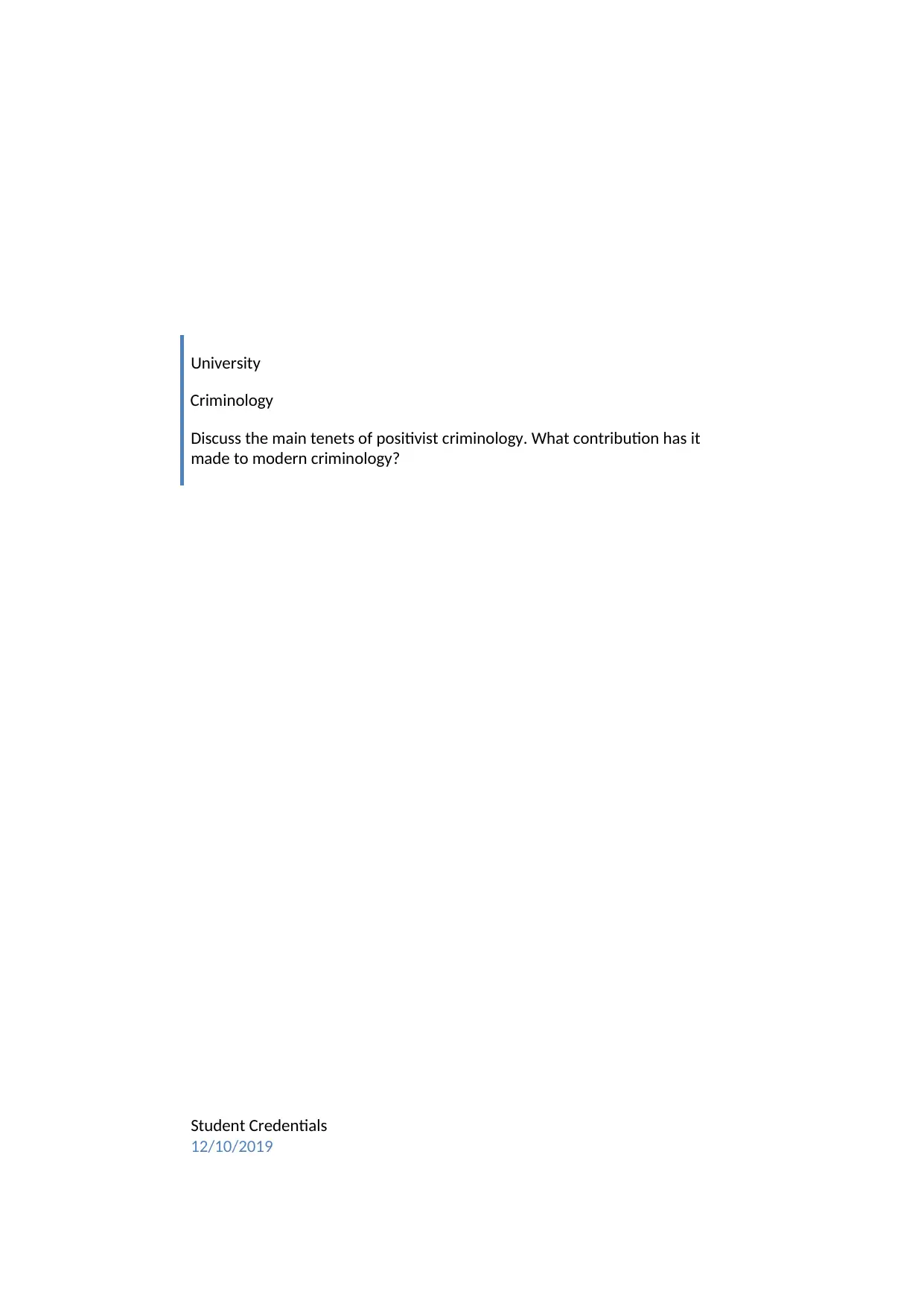
University
Criminology
Discuss the main tenets of positivist criminology. What contribution has it
made to modern criminology?
Student Credentials
12/10/2019
Criminology
Discuss the main tenets of positivist criminology. What contribution has it
made to modern criminology?
Student Credentials
12/10/2019
Paraphrase This Document
Need a fresh take? Get an instant paraphrase of this document with our AI Paraphraser
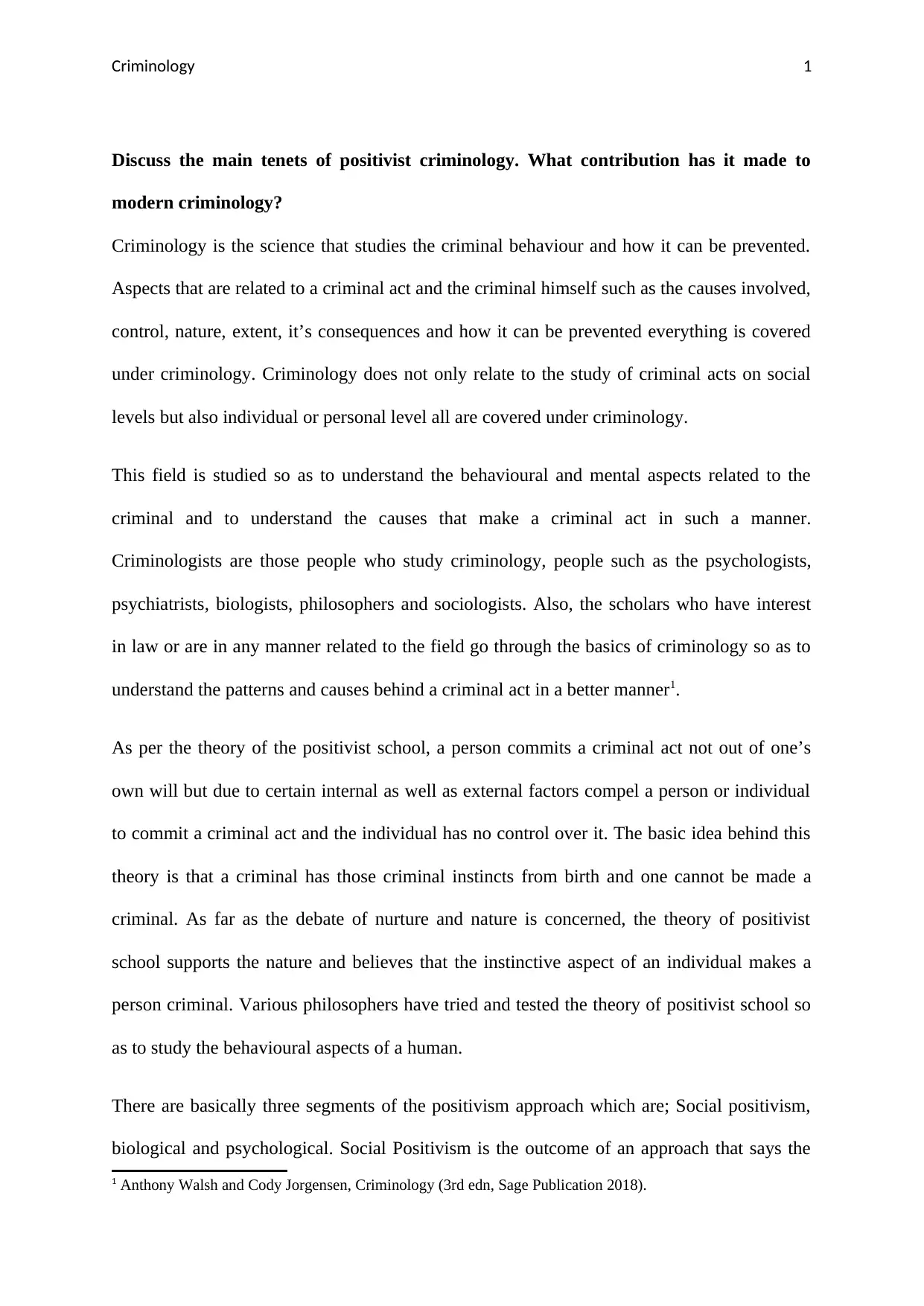
Criminology 1
Discuss the main tenets of positivist criminology. What contribution has it made to
modern criminology?
Criminology is the science that studies the criminal behaviour and how it can be prevented.
Aspects that are related to a criminal act and the criminal himself such as the causes involved,
control, nature, extent, it’s consequences and how it can be prevented everything is covered
under criminology. Criminology does not only relate to the study of criminal acts on social
levels but also individual or personal level all are covered under criminology.
This field is studied so as to understand the behavioural and mental aspects related to the
criminal and to understand the causes that make a criminal act in such a manner.
Criminologists are those people who study criminology, people such as the psychologists,
psychiatrists, biologists, philosophers and sociologists. Also, the scholars who have interest
in law or are in any manner related to the field go through the basics of criminology so as to
understand the patterns and causes behind a criminal act in a better manner1.
As per the theory of the positivist school, a person commits a criminal act not out of one’s
own will but due to certain internal as well as external factors compel a person or individual
to commit a criminal act and the individual has no control over it. The basic idea behind this
theory is that a criminal has those criminal instincts from birth and one cannot be made a
criminal. As far as the debate of nurture and nature is concerned, the theory of positivist
school supports the nature and believes that the instinctive aspect of an individual makes a
person criminal. Various philosophers have tried and tested the theory of positivist school so
as to study the behavioural aspects of a human.
There are basically three segments of the positivism approach which are; Social positivism,
biological and psychological. Social Positivism is the outcome of an approach that says the
1 Anthony Walsh and Cody Jorgensen, Criminology (3rd edn, Sage Publication 2018).
Discuss the main tenets of positivist criminology. What contribution has it made to
modern criminology?
Criminology is the science that studies the criminal behaviour and how it can be prevented.
Aspects that are related to a criminal act and the criminal himself such as the causes involved,
control, nature, extent, it’s consequences and how it can be prevented everything is covered
under criminology. Criminology does not only relate to the study of criminal acts on social
levels but also individual or personal level all are covered under criminology.
This field is studied so as to understand the behavioural and mental aspects related to the
criminal and to understand the causes that make a criminal act in such a manner.
Criminologists are those people who study criminology, people such as the psychologists,
psychiatrists, biologists, philosophers and sociologists. Also, the scholars who have interest
in law or are in any manner related to the field go through the basics of criminology so as to
understand the patterns and causes behind a criminal act in a better manner1.
As per the theory of the positivist school, a person commits a criminal act not out of one’s
own will but due to certain internal as well as external factors compel a person or individual
to commit a criminal act and the individual has no control over it. The basic idea behind this
theory is that a criminal has those criminal instincts from birth and one cannot be made a
criminal. As far as the debate of nurture and nature is concerned, the theory of positivist
school supports the nature and believes that the instinctive aspect of an individual makes a
person criminal. Various philosophers have tried and tested the theory of positivist school so
as to study the behavioural aspects of a human.
There are basically three segments of the positivism approach which are; Social positivism,
biological and psychological. Social Positivism is the outcome of an approach that says the
1 Anthony Walsh and Cody Jorgensen, Criminology (3rd edn, Sage Publication 2018).
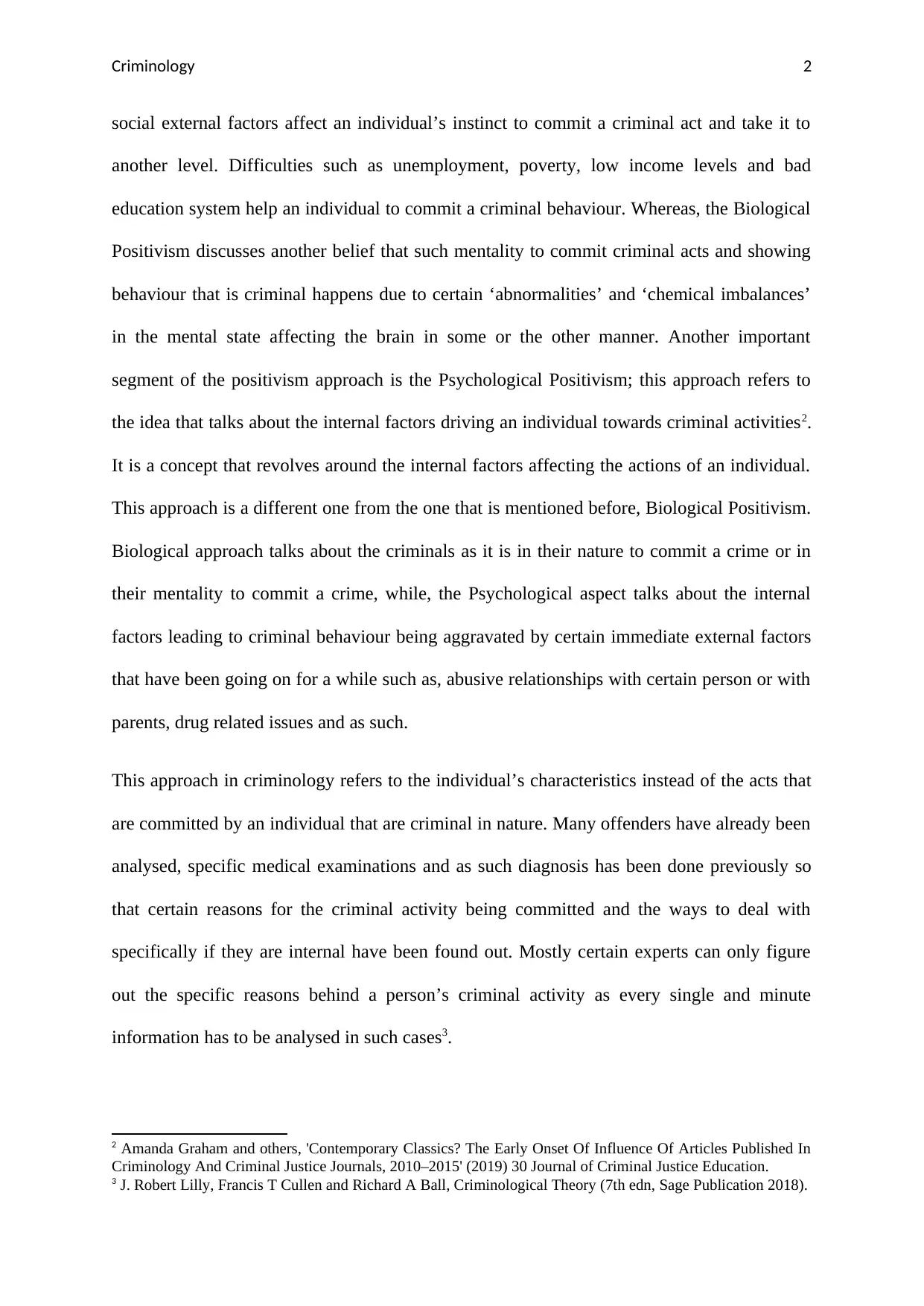
Criminology 2
social external factors affect an individual’s instinct to commit a criminal act and take it to
another level. Difficulties such as unemployment, poverty, low income levels and bad
education system help an individual to commit a criminal behaviour. Whereas, the Biological
Positivism discusses another belief that such mentality to commit criminal acts and showing
behaviour that is criminal happens due to certain ‘abnormalities’ and ‘chemical imbalances’
in the mental state affecting the brain in some or the other manner. Another important
segment of the positivism approach is the Psychological Positivism; this approach refers to
the idea that talks about the internal factors driving an individual towards criminal activities2.
It is a concept that revolves around the internal factors affecting the actions of an individual.
This approach is a different one from the one that is mentioned before, Biological Positivism.
Biological approach talks about the criminals as it is in their nature to commit a crime or in
their mentality to commit a crime, while, the Psychological aspect talks about the internal
factors leading to criminal behaviour being aggravated by certain immediate external factors
that have been going on for a while such as, abusive relationships with certain person or with
parents, drug related issues and as such.
This approach in criminology refers to the individual’s characteristics instead of the acts that
are committed by an individual that are criminal in nature. Many offenders have already been
analysed, specific medical examinations and as such diagnosis has been done previously so
that certain reasons for the criminal activity being committed and the ways to deal with
specifically if they are internal have been found out. Mostly certain experts can only figure
out the specific reasons behind a person’s criminal activity as every single and minute
information has to be analysed in such cases3.
2 Amanda Graham and others, 'Contemporary Classics? The Early Onset Of Influence Of Articles Published In
Criminology And Criminal Justice Journals, 2010–2015' (2019) 30 Journal of Criminal Justice Education.
3 J. Robert Lilly, Francis T Cullen and Richard A Ball, Criminological Theory (7th edn, Sage Publication 2018).
social external factors affect an individual’s instinct to commit a criminal act and take it to
another level. Difficulties such as unemployment, poverty, low income levels and bad
education system help an individual to commit a criminal behaviour. Whereas, the Biological
Positivism discusses another belief that such mentality to commit criminal acts and showing
behaviour that is criminal happens due to certain ‘abnormalities’ and ‘chemical imbalances’
in the mental state affecting the brain in some or the other manner. Another important
segment of the positivism approach is the Psychological Positivism; this approach refers to
the idea that talks about the internal factors driving an individual towards criminal activities2.
It is a concept that revolves around the internal factors affecting the actions of an individual.
This approach is a different one from the one that is mentioned before, Biological Positivism.
Biological approach talks about the criminals as it is in their nature to commit a crime or in
their mentality to commit a crime, while, the Psychological aspect talks about the internal
factors leading to criminal behaviour being aggravated by certain immediate external factors
that have been going on for a while such as, abusive relationships with certain person or with
parents, drug related issues and as such.
This approach in criminology refers to the individual’s characteristics instead of the acts that
are committed by an individual that are criminal in nature. Many offenders have already been
analysed, specific medical examinations and as such diagnosis has been done previously so
that certain reasons for the criminal activity being committed and the ways to deal with
specifically if they are internal have been found out. Mostly certain experts can only figure
out the specific reasons behind a person’s criminal activity as every single and minute
information has to be analysed in such cases3.
2 Amanda Graham and others, 'Contemporary Classics? The Early Onset Of Influence Of Articles Published In
Criminology And Criminal Justice Journals, 2010–2015' (2019) 30 Journal of Criminal Justice Education.
3 J. Robert Lilly, Francis T Cullen and Richard A Ball, Criminological Theory (7th edn, Sage Publication 2018).
⊘ This is a preview!⊘
Do you want full access?
Subscribe today to unlock all pages.

Trusted by 1+ million students worldwide
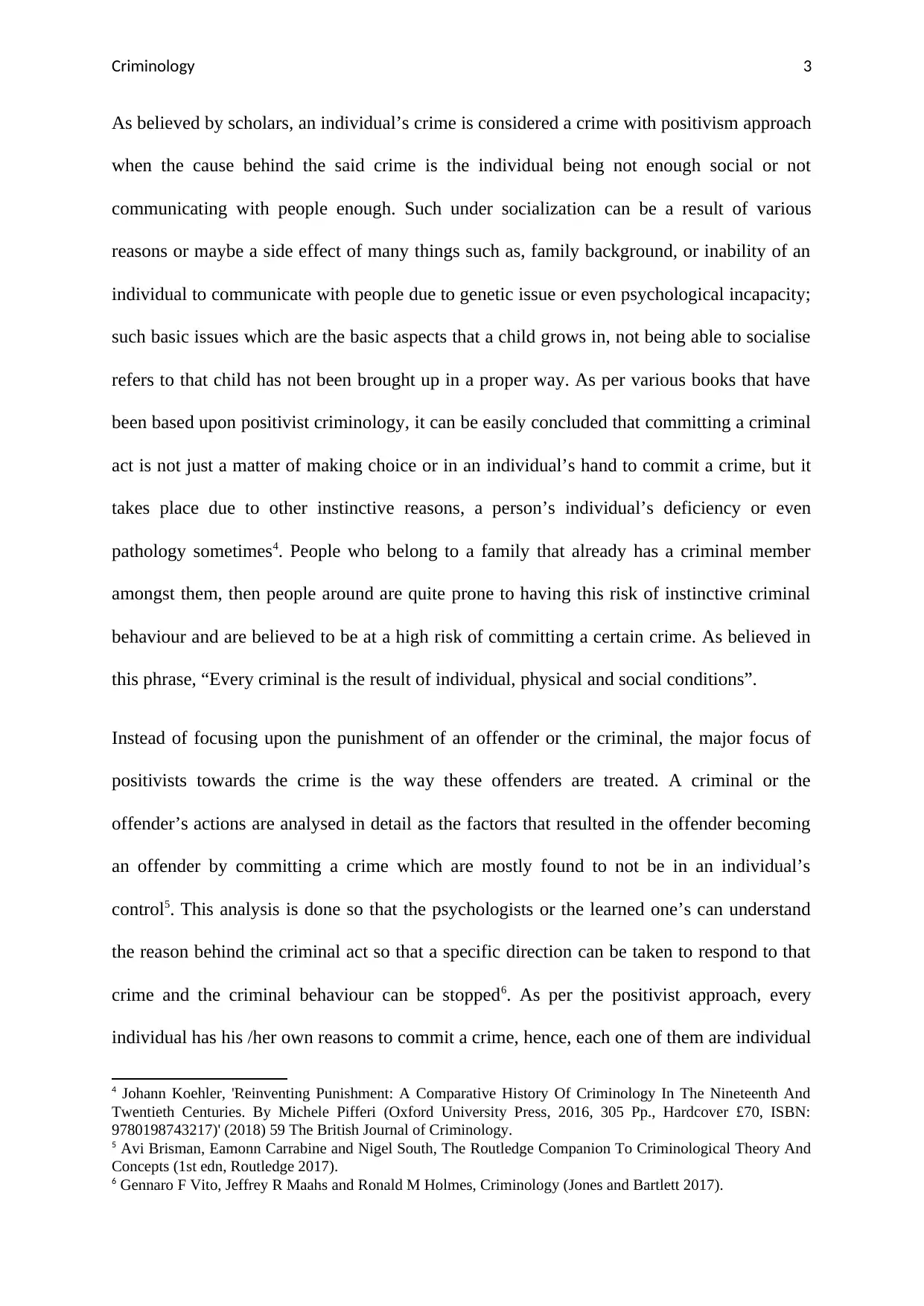
Criminology 3
As believed by scholars, an individual’s crime is considered a crime with positivism approach
when the cause behind the said crime is the individual being not enough social or not
communicating with people enough. Such under socialization can be a result of various
reasons or maybe a side effect of many things such as, family background, or inability of an
individual to communicate with people due to genetic issue or even psychological incapacity;
such basic issues which are the basic aspects that a child grows in, not being able to socialise
refers to that child has not been brought up in a proper way. As per various books that have
been based upon positivist criminology, it can be easily concluded that committing a criminal
act is not just a matter of making choice or in an individual’s hand to commit a crime, but it
takes place due to other instinctive reasons, a person’s individual’s deficiency or even
pathology sometimes4. People who belong to a family that already has a criminal member
amongst them, then people around are quite prone to having this risk of instinctive criminal
behaviour and are believed to be at a high risk of committing a certain crime. As believed in
this phrase, “Every criminal is the result of individual, physical and social conditions”.
Instead of focusing upon the punishment of an offender or the criminal, the major focus of
positivists towards the crime is the way these offenders are treated. A criminal or the
offender’s actions are analysed in detail as the factors that resulted in the offender becoming
an offender by committing a crime which are mostly found to not be in an individual’s
control5. This analysis is done so that the psychologists or the learned one’s can understand
the reason behind the criminal act so that a specific direction can be taken to respond to that
crime and the criminal behaviour can be stopped6. As per the positivist approach, every
individual has his /her own reasons to commit a crime, hence, each one of them are individual
4 Johann Koehler, 'Reinventing Punishment: A Comparative History Of Criminology In The Nineteenth And
Twentieth Centuries. By Michele Pifferi (Oxford University Press, 2016, 305 Pp., Hardcover £70, ISBN:
9780198743217)' (2018) 59 The British Journal of Criminology.
5 Avi Brisman, Eamonn Carrabine and Nigel South, The Routledge Companion To Criminological Theory And
Concepts (1st edn, Routledge 2017).
6 Gennaro F Vito, Jeffrey R Maahs and Ronald M Holmes, Criminology (Jones and Bartlett 2017).
As believed by scholars, an individual’s crime is considered a crime with positivism approach
when the cause behind the said crime is the individual being not enough social or not
communicating with people enough. Such under socialization can be a result of various
reasons or maybe a side effect of many things such as, family background, or inability of an
individual to communicate with people due to genetic issue or even psychological incapacity;
such basic issues which are the basic aspects that a child grows in, not being able to socialise
refers to that child has not been brought up in a proper way. As per various books that have
been based upon positivist criminology, it can be easily concluded that committing a criminal
act is not just a matter of making choice or in an individual’s hand to commit a crime, but it
takes place due to other instinctive reasons, a person’s individual’s deficiency or even
pathology sometimes4. People who belong to a family that already has a criminal member
amongst them, then people around are quite prone to having this risk of instinctive criminal
behaviour and are believed to be at a high risk of committing a certain crime. As believed in
this phrase, “Every criminal is the result of individual, physical and social conditions”.
Instead of focusing upon the punishment of an offender or the criminal, the major focus of
positivists towards the crime is the way these offenders are treated. A criminal or the
offender’s actions are analysed in detail as the factors that resulted in the offender becoming
an offender by committing a crime which are mostly found to not be in an individual’s
control5. This analysis is done so that the psychologists or the learned one’s can understand
the reason behind the criminal act so that a specific direction can be taken to respond to that
crime and the criminal behaviour can be stopped6. As per the positivist approach, every
individual has his /her own reasons to commit a crime, hence, each one of them are individual
4 Johann Koehler, 'Reinventing Punishment: A Comparative History Of Criminology In The Nineteenth And
Twentieth Centuries. By Michele Pifferi (Oxford University Press, 2016, 305 Pp., Hardcover £70, ISBN:
9780198743217)' (2018) 59 The British Journal of Criminology.
5 Avi Brisman, Eamonn Carrabine and Nigel South, The Routledge Companion To Criminological Theory And
Concepts (1st edn, Routledge 2017).
6 Gennaro F Vito, Jeffrey R Maahs and Ronald M Holmes, Criminology (Jones and Bartlett 2017).
Paraphrase This Document
Need a fresh take? Get an instant paraphrase of this document with our AI Paraphraser
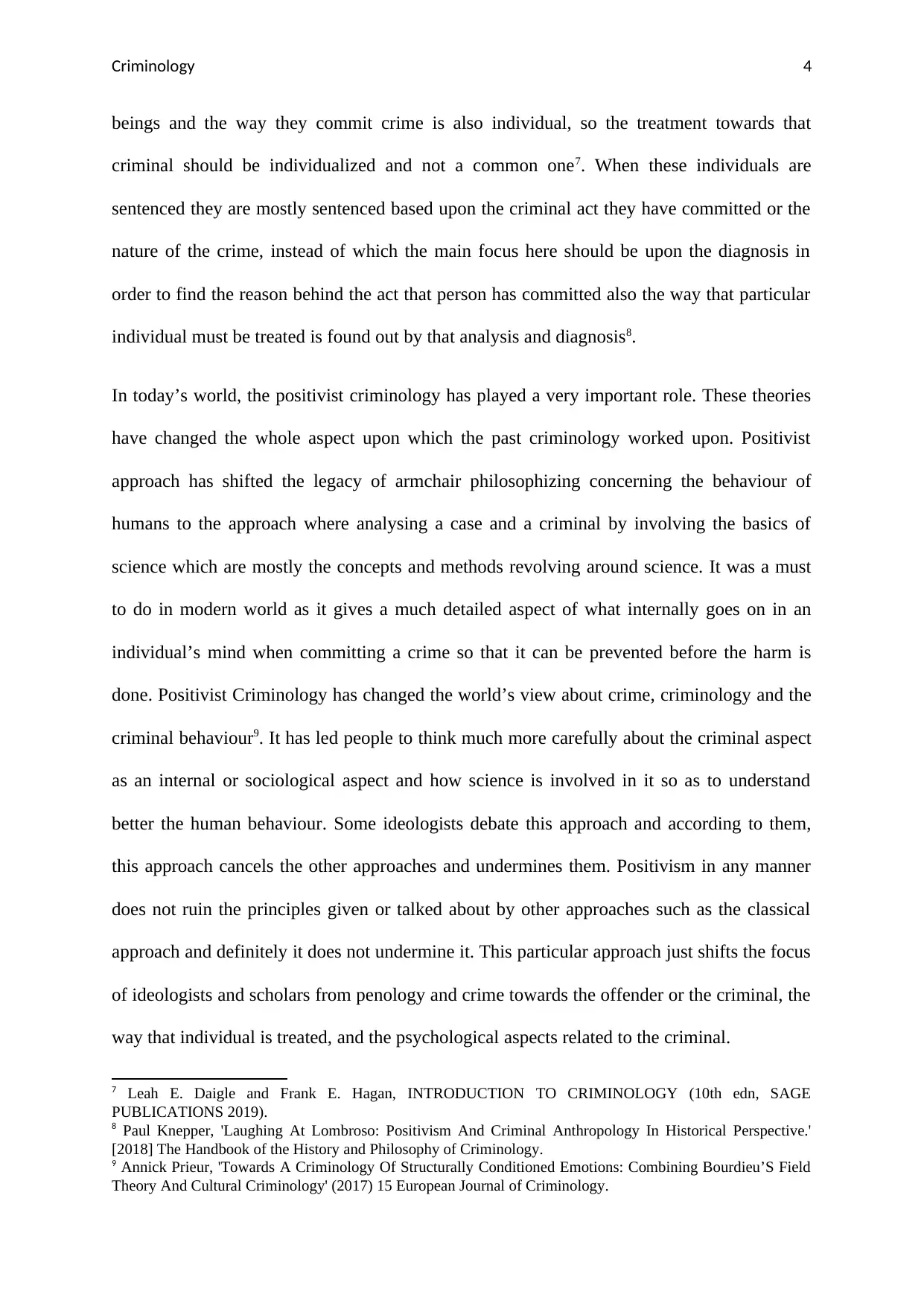
Criminology 4
beings and the way they commit crime is also individual, so the treatment towards that
criminal should be individualized and not a common one7. When these individuals are
sentenced they are mostly sentenced based upon the criminal act they have committed or the
nature of the crime, instead of which the main focus here should be upon the diagnosis in
order to find the reason behind the act that person has committed also the way that particular
individual must be treated is found out by that analysis and diagnosis8.
In today’s world, the positivist criminology has played a very important role. These theories
have changed the whole aspect upon which the past criminology worked upon. Positivist
approach has shifted the legacy of armchair philosophizing concerning the behaviour of
humans to the approach where analysing a case and a criminal by involving the basics of
science which are mostly the concepts and methods revolving around science. It was a must
to do in modern world as it gives a much detailed aspect of what internally goes on in an
individual’s mind when committing a crime so that it can be prevented before the harm is
done. Positivist Criminology has changed the world’s view about crime, criminology and the
criminal behaviour9. It has led people to think much more carefully about the criminal aspect
as an internal or sociological aspect and how science is involved in it so as to understand
better the human behaviour. Some ideologists debate this approach and according to them,
this approach cancels the other approaches and undermines them. Positivism in any manner
does not ruin the principles given or talked about by other approaches such as the classical
approach and definitely it does not undermine it. This particular approach just shifts the focus
of ideologists and scholars from penology and crime towards the offender or the criminal, the
way that individual is treated, and the psychological aspects related to the criminal.
7 Leah E. Daigle and Frank E. Hagan, INTRODUCTION TO CRIMINOLOGY (10th edn, SAGE
PUBLICATIONS 2019).
8 Paul Knepper, 'Laughing At Lombroso: Positivism And Criminal Anthropology In Historical Perspective.'
[2018] The Handbook of the History and Philosophy of Criminology.
9 Annick Prieur, 'Towards A Criminology Of Structurally Conditioned Emotions: Combining Bourdieu’S Field
Theory And Cultural Criminology' (2017) 15 European Journal of Criminology.
beings and the way they commit crime is also individual, so the treatment towards that
criminal should be individualized and not a common one7. When these individuals are
sentenced they are mostly sentenced based upon the criminal act they have committed or the
nature of the crime, instead of which the main focus here should be upon the diagnosis in
order to find the reason behind the act that person has committed also the way that particular
individual must be treated is found out by that analysis and diagnosis8.
In today’s world, the positivist criminology has played a very important role. These theories
have changed the whole aspect upon which the past criminology worked upon. Positivist
approach has shifted the legacy of armchair philosophizing concerning the behaviour of
humans to the approach where analysing a case and a criminal by involving the basics of
science which are mostly the concepts and methods revolving around science. It was a must
to do in modern world as it gives a much detailed aspect of what internally goes on in an
individual’s mind when committing a crime so that it can be prevented before the harm is
done. Positivist Criminology has changed the world’s view about crime, criminology and the
criminal behaviour9. It has led people to think much more carefully about the criminal aspect
as an internal or sociological aspect and how science is involved in it so as to understand
better the human behaviour. Some ideologists debate this approach and according to them,
this approach cancels the other approaches and undermines them. Positivism in any manner
does not ruin the principles given or talked about by other approaches such as the classical
approach and definitely it does not undermine it. This particular approach just shifts the focus
of ideologists and scholars from penology and crime towards the offender or the criminal, the
way that individual is treated, and the psychological aspects related to the criminal.
7 Leah E. Daigle and Frank E. Hagan, INTRODUCTION TO CRIMINOLOGY (10th edn, SAGE
PUBLICATIONS 2019).
8 Paul Knepper, 'Laughing At Lombroso: Positivism And Criminal Anthropology In Historical Perspective.'
[2018] The Handbook of the History and Philosophy of Criminology.
9 Annick Prieur, 'Towards A Criminology Of Structurally Conditioned Emotions: Combining Bourdieu’S Field
Theory And Cultural Criminology' (2017) 15 European Journal of Criminology.
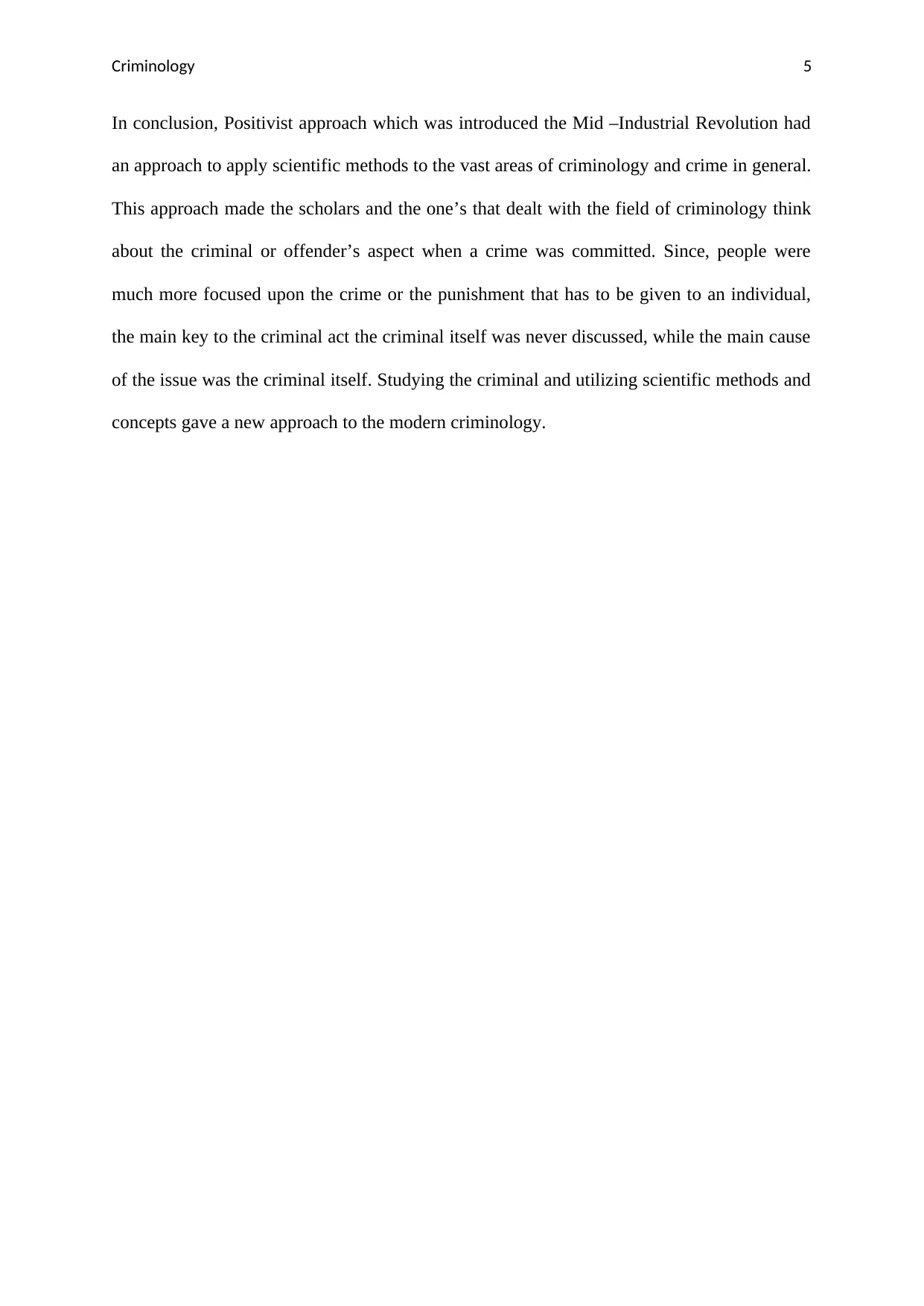
Criminology 5
In conclusion, Positivist approach which was introduced the Mid –Industrial Revolution had
an approach to apply scientific methods to the vast areas of criminology and crime in general.
This approach made the scholars and the one’s that dealt with the field of criminology think
about the criminal or offender’s aspect when a crime was committed. Since, people were
much more focused upon the crime or the punishment that has to be given to an individual,
the main key to the criminal act the criminal itself was never discussed, while the main cause
of the issue was the criminal itself. Studying the criminal and utilizing scientific methods and
concepts gave a new approach to the modern criminology.
In conclusion, Positivist approach which was introduced the Mid –Industrial Revolution had
an approach to apply scientific methods to the vast areas of criminology and crime in general.
This approach made the scholars and the one’s that dealt with the field of criminology think
about the criminal or offender’s aspect when a crime was committed. Since, people were
much more focused upon the crime or the punishment that has to be given to an individual,
the main key to the criminal act the criminal itself was never discussed, while the main cause
of the issue was the criminal itself. Studying the criminal and utilizing scientific methods and
concepts gave a new approach to the modern criminology.
⊘ This is a preview!⊘
Do you want full access?
Subscribe today to unlock all pages.

Trusted by 1+ million students worldwide
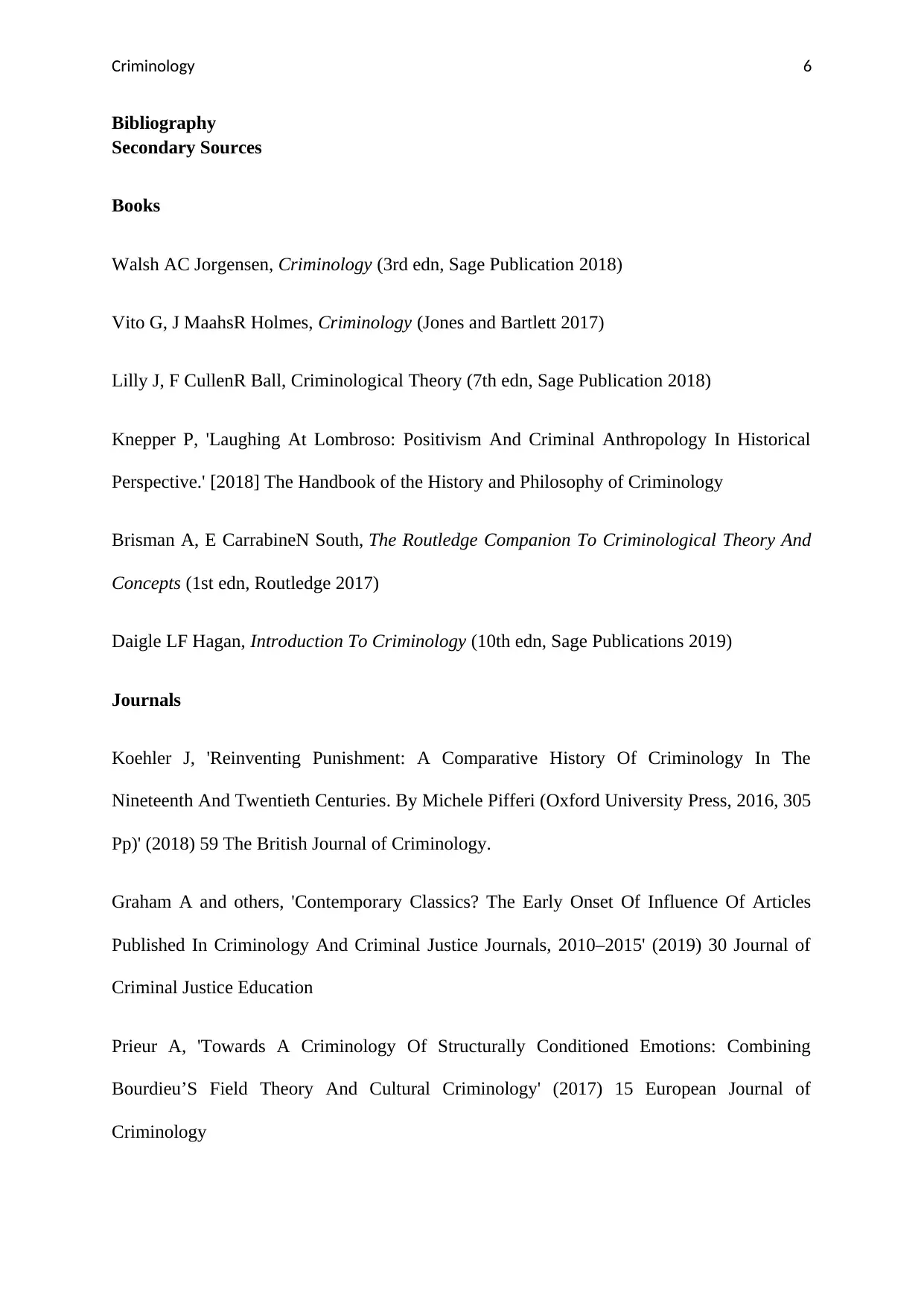
Criminology 6
Bibliography
Secondary Sources
Books
Walsh AC Jorgensen, Criminology (3rd edn, Sage Publication 2018)
Vito G, J MaahsR Holmes, Criminology (Jones and Bartlett 2017)
Lilly J, F CullenR Ball, Criminological Theory (7th edn, Sage Publication 2018)
Knepper P, 'Laughing At Lombroso: Positivism And Criminal Anthropology In Historical
Perspective.' [2018] The Handbook of the History and Philosophy of Criminology
Brisman A, E CarrabineN South, The Routledge Companion To Criminological Theory And
Concepts (1st edn, Routledge 2017)
Daigle LF Hagan, Introduction To Criminology (10th edn, Sage Publications 2019)
Journals
Koehler J, 'Reinventing Punishment: A Comparative History Of Criminology In The
Nineteenth And Twentieth Centuries. By Michele Pifferi (Oxford University Press, 2016, 305
Pp)' (2018) 59 The British Journal of Criminology.
Graham A and others, 'Contemporary Classics? The Early Onset Of Influence Of Articles
Published In Criminology And Criminal Justice Journals, 2010–2015' (2019) 30 Journal of
Criminal Justice Education
Prieur A, 'Towards A Criminology Of Structurally Conditioned Emotions: Combining
Bourdieu’S Field Theory And Cultural Criminology' (2017) 15 European Journal of
Criminology
Bibliography
Secondary Sources
Books
Walsh AC Jorgensen, Criminology (3rd edn, Sage Publication 2018)
Vito G, J MaahsR Holmes, Criminology (Jones and Bartlett 2017)
Lilly J, F CullenR Ball, Criminological Theory (7th edn, Sage Publication 2018)
Knepper P, 'Laughing At Lombroso: Positivism And Criminal Anthropology In Historical
Perspective.' [2018] The Handbook of the History and Philosophy of Criminology
Brisman A, E CarrabineN South, The Routledge Companion To Criminological Theory And
Concepts (1st edn, Routledge 2017)
Daigle LF Hagan, Introduction To Criminology (10th edn, Sage Publications 2019)
Journals
Koehler J, 'Reinventing Punishment: A Comparative History Of Criminology In The
Nineteenth And Twentieth Centuries. By Michele Pifferi (Oxford University Press, 2016, 305
Pp)' (2018) 59 The British Journal of Criminology.
Graham A and others, 'Contemporary Classics? The Early Onset Of Influence Of Articles
Published In Criminology And Criminal Justice Journals, 2010–2015' (2019) 30 Journal of
Criminal Justice Education
Prieur A, 'Towards A Criminology Of Structurally Conditioned Emotions: Combining
Bourdieu’S Field Theory And Cultural Criminology' (2017) 15 European Journal of
Criminology
1 out of 7
Related Documents
Your All-in-One AI-Powered Toolkit for Academic Success.
+13062052269
info@desklib.com
Available 24*7 on WhatsApp / Email
![[object Object]](/_next/static/media/star-bottom.7253800d.svg)
Unlock your academic potential
Copyright © 2020–2026 A2Z Services. All Rights Reserved. Developed and managed by ZUCOL.





